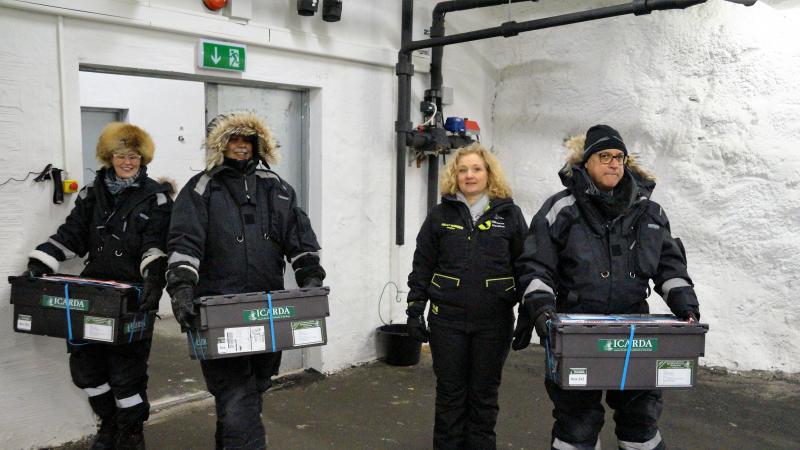Margret Thalwitz: “Seed collections are among most precious public goods”

Margret Thalwitz, ICARDA Board Chair, called seed vaults in Svalbard (Norway) and other parts of the world “treasures which are among the most precious public goods we have”.
At the end of February, ICARDA successfully deposited 15,420 seed samples for long-term conservation in the Svalbard Seed Vault. Margret Thalwitz was among those who participated in the milestone event.
“It was a very special moment to carry a box of seeds down the long corridor of the vault in our ‘professional’ outfits and put the box back on the shelf where it belongs. We knew then, that we were holding treasures in our hands that generations of scientists to come may still use to help humanity feed itself. This sounds dramatic but in a way you feel that weight when inside the vault,” Margret Thalwitz said.
She called on ICARDA to “do more to make it better known to the general public how important it is to preserve these treasures which are among the most precious public goods we have”.
“We work with some of the oldest species that modern agriculture needs to become more resilient to external threats such as heat, cold, salinity, new diseases etc. We have a collection that covers a great variety of different crops and we have partners that collect and conserve the genetic resources of complementary crops foremost, CGIAR genebanks, national genebanks, AVRDC, and also others,” Margret Thalwitz added.
“There is a convincing story to explain how the richness of the MENA/Central Asia agricultural inheritance can be used to overcome today's poor agricultural performance existentially threatened by externally induced changes and inadequate management of increasingly scarce natural resources,” ICARDA's Board Chair emphasized.
“The seeds we stored in the Svalbard Vault have traits that can assist the development of new crops, helping to meet the challenges posed by climate change, drought, heat, pests, and salinity,” said Mr. Aly Abousabaa, ICARDA Director General.
In 2015, ICARDA became the first organization to withdraw seeds from the Svalbard Vault as a response to the fact that although the 141,000 accessions constituting the ICARDA active genebank in war-torn Aleppo were stored safely, they could no longer be regenerated or distributed to breeders and researchers.
The seeds retrieved from Svalbard were planted for multiplication and reconstitution of the collections to set up active genebanks in Lebanon and Morocco, marking an important stage in ICARDA’s decentralization framework, financed by the Genebank CRP and the Global Crop Diversity Trust along with the Arab Fund for Economic and Social Development (AFESD), Kuwait Fund for Arab Economic Development and other donors.
The collections established in Lebanon and Morocco will enable ICARDA to share these precious seeds with research organizations and breeders worldwide and bringing the global community one step closer to a food secure world.
